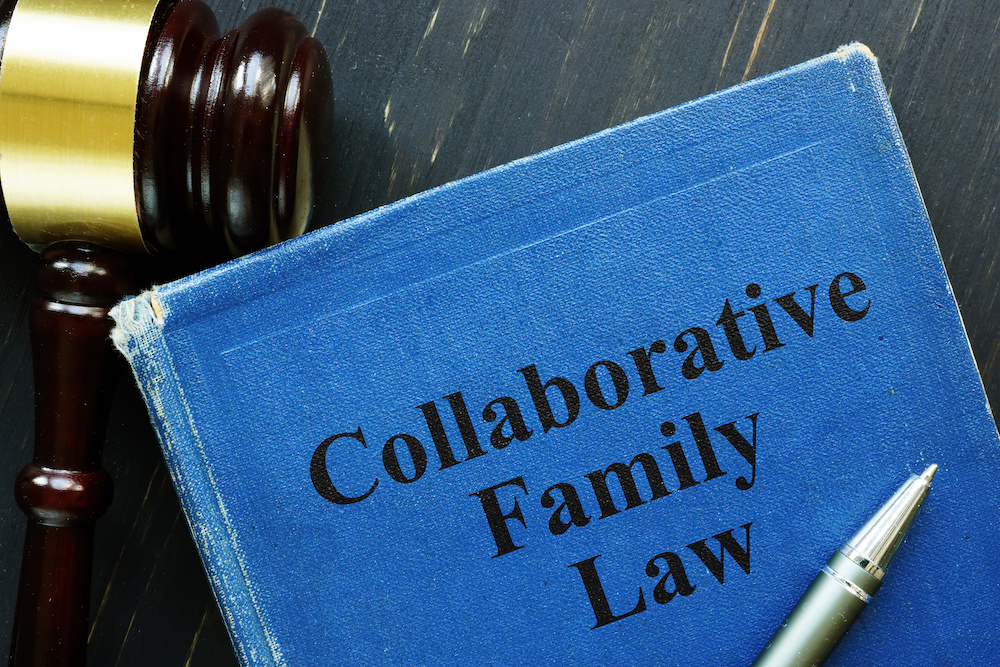There are a few different divorce processes to consider if you are getting divorced. They include: sitting down with your ex and coming to an agreement on custody, financials, assets and more, going to a divorce mediator to mediate your divorce, getting attorneys and going through litigation, and finally, one of the best ways to get divorce: going through the collaborative divorce process. What is collaborative divorce and why is it so wonderful?
A collaborative divorce is a process in which spouses and their attorneys work together to come to divorce agreements. These agreements can include: custody, finances, assets, real estate and more. Each collaborative divorce is unique, and depends on the divorcing couple’s situation, but what every collaborative divorce has in common is:
1. There is no going to court.
2. The process involves thoughtful negotiation.
3. The focus is on problem solving, not fighting or winning and losing.
In a collaborative divorce, each spouse has their own attorney, and the two attorneys call in experts to help in the process as needed. The experts can include: a divorce coach, a mediator, a financial advisor, a real estate agent, a therapist, an accountant, or any other professional needed in a certain divorce situation. The focus is to give the couple the support they need and empower them to make informed choices and shape their future in a way that works for them and their family.
It might sound like a lot of people, but the benefit of having all of these experts working together is that they can work as a team to help suggest the best possible agreements—which work for both of the divorcing parties. Also, not every case needs all of these professionals.
Your attorneys will help you figure out what information would be helpful to you in making your decision. In many instances having additional professionals can actually help you save money. You might wonder, how is that possible? Bottom line, many of these professionals bill at lower rates that attorneys, and bringing them into the process often allows you to make better informed decisions faster, which in turn means you are more efficient in how you make your decisions, which saves you money.
Here are the steps in a collaborative divorce:
1. You contact an attorney who can talk to you about different divorce processes, like collaborative divorce process, mediation or litigation. Anna Krolikowska has experience with all these divorce methods and can help you figure out which would work best for you.
2. You hire Anna and decide that you would like to suggest collaborative process to your spouse. Anna can help you prepare for the conversation with your spouse where you can introduce the idea of collaborative divorce (or mediation) and can give you additional information and resources to share with your spouse.
3. Your spouse agrees to collaborative divorce and hires a collaborative attorney. This is an important step. Sometimes the spouse will say that they want to be amicable and have an amicable or co-operative divorce, but if they don’t hire an attorney trained in and practicing collaborative divorce then you will not be able to have a collaborative divorce.
You can still do your best to have an amicable divorce, but without each spouse being represented by a collaborative attorney we will not be able to use a collaborative method to the divorce. (And while I am on the subject, let’s clarify one big misconception about mediation. A mediator’s role is to be a neutral and help you and your spouse discuss, negotiate and hopefully arrive at an agreement. They will eventually write up an memorandum of understating BUT then you either need to finalize the divorce case in the court system by yourself OR hire at least one attorney to help one of you by preparing all the legal documents, including the divorce settlement agreements, file the divorce case and get you divorced).
4. Each spouse works with his/ her attorney and a coach to prepare for the team meetings.
5. In a series of team meetings, in which the spouses, attorneys and any helpful professionals participate, the couple discuss and agree to the settlement terms of the divorce. This process allows the couple greater control not only over the settlement terms, but also over the pacing of the case or scheduling of the meetings than a traditional litigated court case.
The spouses also have the support and input of their attorneys in settlement meetings, which they do not usually have in mediation, as most mediators do not include attorneys in settlement meetings. In addition, currently couples using collaborative divorce process or mediation can finalize their divorces faster than couples going through the litigated divorces.
6. Once the couple has agreed to the terms of the divorce the attorney, the collaborative attorneys prepare the documents needed to finalize the case.
7. Once the couple signs the divorce documents prepared by their attorneys, the documents are submitted to the court. Depending where the case is filed the divorce might be finalized either through a one and only court appearance called a prove-up, or through submission of the signed divorce agreements and supporting documents. and sent to the plan administrators for processing. This is an important step.
8. Don’t forget to update your estate plans and update your beneficiary designations on your life insurance policies and retirement accounts to comply with your divorce decree.
Another great benefit of a collaborative divorce:
The attorneys have no financial incentive to dispute an issue. Instead, the attorneys are working to help you come up with a plan (with the help of the customized divorce team in your case) that they think is fair and equitable, and that both parties will be happy with. In other words, YOU get to have a say in the outcome of your divorce and your divorce process, and by the time it is ready to be finalized, YOU have agreed to things like a custody schedule, holidays, maintenance, child support, the house and other assets as well as how best to spend your money on your divorce process.
In the long-run, couples who go through a collaborative divorce have more of a chance of walking away from the divorce with agreements they feel good about. Therefore, they are more likely to comply with these agreements, and communicate with their ex-spouse in a healthier, happier way. This not only benefits the divorcing couple, but it offers a tremendous upside for the children!
In essence, a collaborative divorce is similar to divorce mediation, only with other experts helping to offer advice and support in their fields, so that you have the divorce you want.
High net-worth couples and the collaborative divorce process:
Historically, high net-worth couples with a lot of assets and financial complexity have used the litigation process to get divorced. This can cost tens of thousands, (if not hundreds of thousands) of dollars in attorney and court fees. It can also take years to get divorced and can result in a trial if the couple cannot come to agreements. Moreover, it means that often private and sensitive details of their lives become part of a public court file.
Litigation can also cause divorcing couples to become angry, frustrated and combative, which causes them to be unhappy, and of course, the kids to feel insecure and sad. In the collaborative divorce process, couples feel heard, they feel validated, and they feel like they are in control of the agreements that are going to shape their lives moving forward. They can also maintain their privacy, come up with agreements that work for them, and spend their money on the divorce process in a more efficient and productive way.
I’ve been practicing law for 16+ years and have had so much success when my clients use the collaborative divorce process. More importantly, my clients are happy with their divorce experiences and outcomes. Here are two testimonials from my clients who got divorced through the collaborative process:
“I’ve known Anna for almost a year and she’s been a great resource from Day 1. Her work ethic, sense of collaboration, and drive to excel in her profession immediately stood out among the other divorce related professionals with whom I work. Having recently worked alongside her on a collaborative divorce, I watched her combine those professional skills with her interpersonal skills to provide our mutual client a result that was above her expectation, left both parties confident in the result, and maintained the strong relationship between the divorcing parties. It was GENIUS!! 🙂”
By: Thomas Wagner ★★★★★
“I selected Anna to represent me through my divorce proceedings. She is a great listener and she’s a compassionate partner yet she was always a strong advocate for my best interests throughout the process. It was important to me (and my former spouse) that our process would be collaborative and not injurious to us and our family. Anna ensured we achieved our goals and we emerged feeling whole thanks to her.”
By: M.H ★★★★★
“I had the opportunity to work with Anna and her team. From the initial visit it was clear there are advantages working through collaboration process versus litigation for the separating couple as well as having a clear plan given that we had a child involved. Anna was professional and very helpful navigating conversations while providing guidance on next steps throughout the process and focusing on working together as a team to create a parenting & separation agreement that is agreeable to all parties. I would highly recommended speaking with Anna prior toward choosing a route outside of collaboration or selecting another firm to work their case.”
By: R. ★★★★★
“My Divorce was complex and at times the circumstances were not easy. Anna guided our divorce using a Collaborative approach which greatly improved the process. Ultimately, we were able to come to an equitable agreement and reach closure for our marriage. I am grateful to Anna for her counsel and guidance through the experience.”
By: M.L. ★★★★★

In closing, if you’d like to hear more about the collaborative divorce process, and find out if it might be the right decision for you, I’m happy to offer you a complimentary consultation. Feel free to call me at (847) 715-9328 or visit my website at www.annaklaw.com. You can also follow Anna on social media at: Facebook.com/AttyKrolikowska, on Instagram: @annaklawchicago, on LinkedIn https://www.linkedin.com/company/annaklaw or on Twitter @AnnaK_Law
Like this article? Check out, “6 Tips for Facebook and other Social Media During Divorce”






















